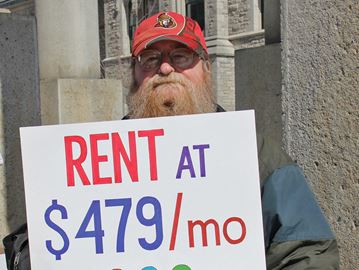Ottawa Community News: ACORN demands housing allowance increase for Ontario’s disabled
Posted March 23, 2015
Social justice group wants 20 per cent hike
Posted March 23, 2015
 For Ray Noyes, $479 isn’t enough.
For Ray Noyes, $479 isn’t enough.The 59-year-old Vanier resident has been in the Ontario Disability Support Plan since shortly after he was diagnosed with bipolar disorder in 1997. He had been studying religion at Carleton University when his father committed suicide, pushing him into a deep depression.
The support plan now gives him a housing allowance of $479, and benefits of $619 for basic needs. The rent of his bachelor apartment is currently $600.
“The amount they offer for a shelter allowance is well below what people can actually find in terms of housing,” he said.
“Anything that’s not an ordinary monthly expense is very hard to deal with.”
While his rent has risen over the years, his housing allowance has not kept up. He has had to spend less and less money on other expenses such as food. He has worn the same shirts for the last 20 years, and he can only dream of not having to go down to the library every day to check his email, as he has no Internet access at home.
Where there was once a $60 gap between his rent and the housing allowance, Noyes now faces a $121 hole.
And Noyes isn’t alone.
The Association of Community Organizations for Reform Now — known as ACORN — held a protest on March 18 at the Human Rights Monument to demand the provincial government raise the housing allowance by 20 per cent. Members of the social justice group said the increase would allow disabled people to live more comfortably without having to dip into income that could be spent on food or other essentials.
“$479 just doesn’t do it,” said Blaine Cameron, a Centretown resident who suffers from muscular dystrophy and has not been able to work since 2010.
“Where can you find rent like that?”
He pays $760 for his half of the rent in a two-bedroom apartment. Cameron said he would not be able to cope if he did not have financial support from his family.
“Many don’t have that option,” he said. “And they have to sacrifice their health to pay rent and bills.”
A 20 per cent hike in the housing allowance would give Noyes an additional $95 per month, which he said would go a long way.
“If we got the 20 per cent, it would help people a lot,” he said. “It would still make me $30 short, but having $90 more than I have now – someone in my position can really make it work.”
***
Article by Alex Robinson for Ottawa East News
